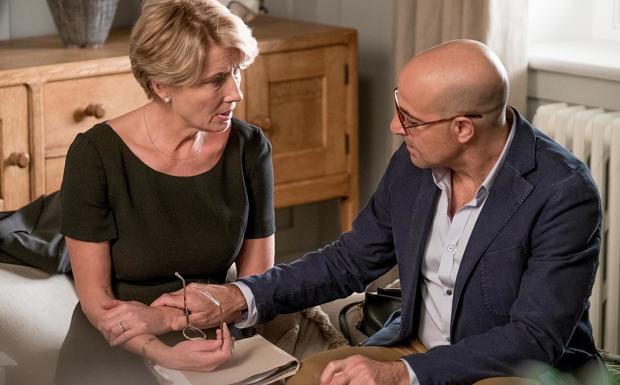The Children Act
The old story goes that director Howard Hawks bet Ernest Hemingway that he could make a successful film of Hemingway’s least important novel. Hawks came up with To Have and Have Not (1945), which had almost nothing to do with the same-titled book, as Hemingway observed more than once.
Authors have long complained about the way movies treat, or mistreat, their books. The prominent British novelist Ian McEwan is at least somewhat limited in the scope of any complaints he may have about the new movie version of his novel, The Children Act, since he wrote the screenplay. Richard Eyre’s movie is intellectually and morally provocative and emotionally engaging for much of its length. It’s also puzzlingly incomplete.
Emma Thompson stars as Fiona Maye, a British family law judge who is deciding whether Adam (Fionn Whitehead), a 17-year-old youth critically diagnosed with leukemia, can be ordered to submit to a blood transfusion. Adam and his parents are Jehovah’s Witnesses and their faith forbids transfusions, even if, as in this case, the patient’s life is at stake.
Fiona takes the very unconventional step of visiting the boy at the hospital to try to ascertain his ability to make a mature, independent decision. The encounter of judge and young patient will have unusual and unforeseen consequences that are both moral and personal.
Thompson’s expert performance sustains an impressive subtlety and control as the movie depicts the jurist’s carefully achieved order in her personal life and career. At home, her very neglected husband (Stanley Tucci) candidly confronts her with his contemplated extramarital affair, even though he loves her. Fiona reacts with surprise and vindictiveness. And Adam’s post-court decision fate begins to impinge on her in disturbing ways.
Eyre’s (The Older Man) direction is fluid and engaging, the photography (Andrew Dunn) is handsome and Whitehead, who made his debut last year in Dunkirk, contributes a poignantly appealing and eventually gripping portrait of Adam.
But the movie feels incomplete and abrupt in its ending. The interactions between Fiona and Adam are primarily portrayed from her point of view, and what this all means to him isn’t obvious or even adequately implied. At the end, we’re supposed to sympathize with Fiona’s acceptance of her insufficiently sensitive response to both the boy and her husband’s needs but the resolution is too skimpy and unrevealing. The Children Act is involving until it avoids the questions it has raised.
Opens Friday at the Dipson Eastern Hills and North Park theaters.

